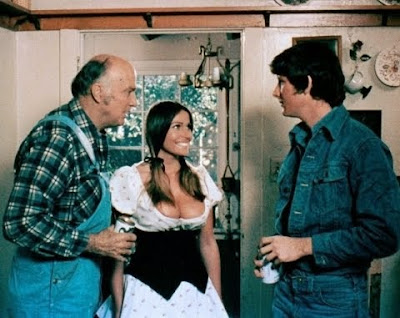Absolute Beginners
Filmed musicals always tread a dangerously fine line between success and failure, between grandeur and garishness. The very spectacle of song and dance makes the material vulnerable to excess and silliness, no matter how noble the intention. 1986's ABSOLUTE BEGINNERS attempts to seriously address racial tensions in 1958 London, in addition to making statements about celebrity and changing culture. In one hundred and eight chaotic, sometimes headache inducing minutes, it succeeds in its laundry list aspirations but fails to examine any of them with any real dramatic weight.
That leaves the glitter. Director Julien Temple, best known for short form rock videos and the Sex Pistols documentary THE GREAT ROCK 'N' ROLL SWINDLE, teams with cinematographer Oliver Stapleton to frame a brilliantly lit, eye popping swirl around impressive sets. They create a very lengthy unbroken tracking shot around city streets that rivals the long dollies in TOUCH OF EVIL and THE PLAYER (in which someone refers to this movie, by the way). That scene is very impressive, but like the rest of the film only exists intrinsically, in the moment. Points are made within it by narrator/lead character Colin (Eddie O'Connell) about the plight of post WWII London, but poignancy is at a minimum. Surely Colin MacInne's original novel was more urgent?
The fictional Colin is a lovesick shutterbug, attempting to escape his dour childhood slum of Napoli and win fame by selling photographs of the elite at play. He pines for a cute fashion designer called Crepe Suzette (Patsy Kinsit) who seems to return his affections but is willing to sell him out for her own shot at fame. The two part ways early on, each swallowed by the flashy culture of pre-Beatles London, alliances made with greedy hedonists and developers who will evacuate black residents from their neighborhoods at the same time that a horde of white supremacists will rise. The infamous Notting Hill riots will follow. Will hope rise from the shattered glass? Will Love conquer Hate? Whose decision was it to add lyrics to Miles Davis' "So What", a piece that plays during the closing moments of this movie?
And that bit reminded me of a later film that perhaps owes a bit to ABSOLUTE BEGINNERS, MOULIN ROUGE! Baz Luhrmann's over the top evocation of Paris life and love featured re-imaginings of lots of songs, including "Smells Like Teen Spirit". The two movies actually have quite a bit in common, though Baz's film is more successful. Especially with its choreography. My wife commented that much of the dance in ABSOLUTE BEGINNERS reminded her of XANADU!
Temple never quite achieves cohesion with the often slow paced ABSOLUTE BEGINNERS. Ray Davies plays Colin's ineffectual, milquetoast father Arthur and has an elaborate number called "Quiet Life"s, which winds around an apartment with moments Fred Astaire might've applauded. But David Bowie's "That's Motivation" sequence mostly falls flat (and his title track to the movie is a much better tune). The music, some of it arranged by Gil Evans (the jazz scene is an important backdrop in this movie), is quite disappointing, though Sade's "Killer Blow" is a striking, dynamic song, and her appearance in this movie is a real highlight.
It is after that song that the film becomes decidedly much darker, as racial tensions explode into violence. The entire last passage of ABSOLUTE BEGINNERS is energetic and powerful, but might've been more so had we gotten to know the blacks and white supremacist characters better. This movie was an infamous box office bust, in part leading to the demise of a British studio, but still has a place in history, is still a worthy expenditure of time for fans of the artists and of Brit cinema.





Comments